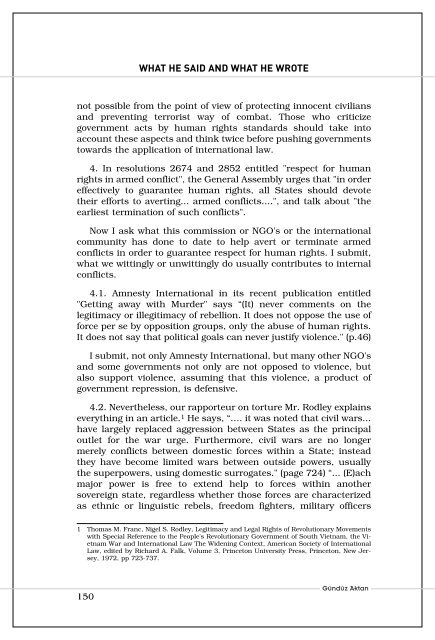gunduz-aktan-kitap-soyledikleri-ve-yazdiklari
gunduz-aktan-kitap-soyledikleri-ve-yazdiklari
gunduz-aktan-kitap-soyledikleri-ve-yazdiklari
Create successful ePaper yourself
Turn your PDF publications into a flip-book with our unique Google optimized e-Paper software.
WHAT HE SAID AND WHAT HE WROTE<br />
not possible from the point of view of protecting innocent civilians<br />
and pre<strong>ve</strong>nting terrorist way of combat. Those who criticize<br />
go<strong>ve</strong>rnment acts by human rights standards should take into<br />
account these aspects and think twice before pushing go<strong>ve</strong>rnments<br />
towards the application of international law.<br />
4. In resolutions 2674 and 2852 entitled "respect for human<br />
rights in armed conflict", the General Assembly urges that "in order<br />
effecti<strong>ve</strong>ly to guarantee human rights, all States should devote<br />
their efforts to a<strong>ve</strong>rting... armed conflicts....", and talk about "the<br />
earliest termination of such conflicts".<br />
Now I ask what this commission or NGO's or the international<br />
community has done to date to help a<strong>ve</strong>rt or terminate armed<br />
conflicts in order to guarantee respect for human rights. I submit,<br />
what we wittingly or unwittingly do usually contributes to internal<br />
conflicts.<br />
4.1. Amnesty International in its recent publication entitled<br />
"Getting away with Murder" says “(It) ne<strong>ve</strong>r comments on the<br />
legitimacy or illegitimacy of rebellion. It does not oppose the use of<br />
force per se by opposition groups, only the abuse of human rights.<br />
It does not say that political goals can ne<strong>ve</strong>r justify violence." (p.46)<br />
I submit, not only Amnesty International, but many other NGO's<br />
and some go<strong>ve</strong>rnments not only are not opposed to violence, but<br />
also support violence, assuming that this violence, a product of<br />
go<strong>ve</strong>rnment repression, is defensi<strong>ve</strong>.<br />
4.2. Ne<strong>ve</strong>rtheless, our rapporteur on torture Mr. Rodley explains<br />
e<strong>ve</strong>rything in an article. 1 He says, “…. it was noted that civil wars...<br />
ha<strong>ve</strong> largely replaced aggression between States as the principal<br />
outlet for the war urge. Furthermore, civil wars are no longer<br />
merely conflicts between domestic forces within a State; instead<br />
they ha<strong>ve</strong> become limited wars between outside powers, usually<br />
the superpowers, using domestic surrogates." (page 724) “... (E)ach<br />
major power is free to extend help to forces within another<br />
so<strong>ve</strong>reign state, regardless whether those forces are characterized<br />
as ethnic or linguistic rebels, freedom fighters, military officers<br />
1 Tho mas M. Franc, Ni gel S. Rod ley, Le gi ti macy and Le gal Rights of Re vo lu tio nary Mo <strong>ve</strong> ments<br />
with Spe ci al Re fe ren ce to the Pe op le's Re vo lu tio nary Go <strong>ve</strong>rn ment of So uth Vi et nam, the Vi -<br />
et nam War and In ter na tio nal Law The Wi de ning Con text, Ame ri can So ci ety of In ter na tio nal<br />
Law, edi ted by Ric hard A. Falk, Vo lu me 3, Prin ce ton Uni <strong>ve</strong>r sity Press, Prin ce ton, New Jer -<br />
sey, 1972, pp 723-737.<br />
150<br />
Gündüz Aktan



